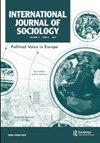Aiding fossil fuel dependency: a cross-national analysis of energy sector aid, national autonomy, and CO2 emissions in 122 nations
IF 1.1
Q2 SOCIOLOGY
引用次数: 2
Abstract
Abstract In the past two decades, sociological research has flourished on the environmental impact of global financial flows from wealthy to poorer nations. The majority of this research, however, focuses on private financial flows such as foreign direct investment or World Bank lending. By contrast, this study examines how public aid dollars (energy sector foreign development aid) contributes to environmental degradation in developing nations. We also examine the effect of this aid relative to domestic autonomy, a form of good governance that measures a nation’s freedom to set its own domestic policy without interference from more powerful states. Using a longitudinal sample of 122 nations, we test the effects of aid and autonomy on CO2 emissions. In line with dependency theory, results show that aid donors encourage fossil fuel dependence in aid recipient countries and this leads to increased carbon dioxide emissions. Counter to some findings on good governance and the environment, our results do not show that domestic autonomy relates directly to carbon dioxide emissions. However, our results do suggest that more autonomous nations can offset the impact of fossil fuel development aid by imposing policies that push aid donors to invest in more environmentally-beneficial development projects.助长对化石燃料的依赖:122个国家能源部门援助、民族自治和二氧化碳排放的跨国分析
在过去的二十年中,关于全球资金从富裕国家流向较贫穷国家对环境影响的社会学研究蓬勃发展。然而,这项研究的主要重点是外国直接投资或世界银行贷款等私人资金流动。相比之下,本研究考察了公共援助资金(能源部门的对外发展援助)如何导致发展中国家的环境退化。我们还研究了这种援助对国内自治的影响,国内自治是一种良好治理的形式,衡量一个国家在不受更强大国家干涉的情况下制定自己的国内政策的自由。我们利用122个国家的纵向样本,测试了援助和自治对二氧化碳排放的影响。根据依赖理论,研究结果表明,援助国鼓励受援国依赖化石燃料,从而导致二氧化碳排放量增加。与一些关于良好治理和环境的研究结果相反,我们的研究结果并未表明家庭自治与二氧化碳排放直接相关。然而,我们的研究结果确实表明,更自主的国家可以通过实施政策来抵消化石燃料开发援助的影响,这些政策推动援助捐助方投资于更有利于环境的发展项目。
本文章由计算机程序翻译,如有差异,请以英文原文为准。
求助全文
约1分钟内获得全文
求助全文

 求助内容:
求助内容: 应助结果提醒方式:
应助结果提醒方式:


